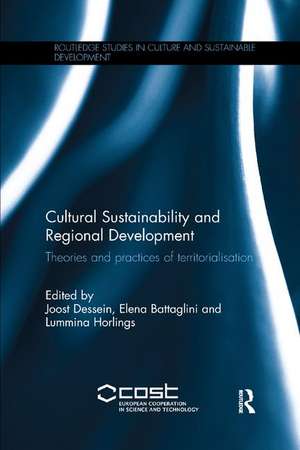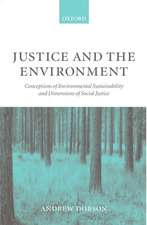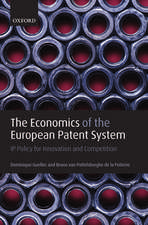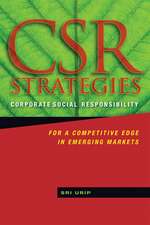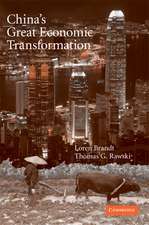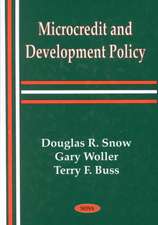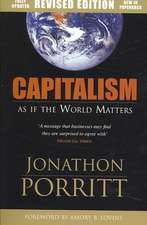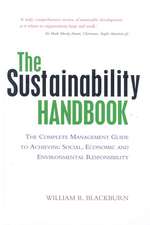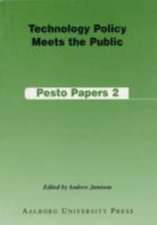Cultural Sustainability and Regional Development: Theories and practices of territorialisation: Routledge Studies in Culture and Sustainable Development
Editat de Joost Dessein, Elena Battaglini, Lummina Horlingsen Limba Engleză Paperback – 16 feb 2017
This book launches the concept of ‘territorialisation’ by exploring how the natural environment and culture are constitutive of each other. This concept allows us to study the characterisation of the natural assets of a place, the means by which the natural environment and culture interact, and how communities assign meaning to local assets, add functions and ascribe rules of how to use space. By highlighting the time-space dimension in the use and consumption of resources, territorialisation helps to frame the concept and grasp the meaning of sustainable regional development. Drawing on an international range of case studies, the book addresses both conceptual issues and practical applications of ‘territorialisation’ in a range of contexts, forms, and scales.
The book will be of great interest to researchers and postgraduates in sustainable development, environmental studies, and regional development and planning.
| Toate formatele și edițiile | Preț | Express |
|---|---|---|
| Paperback (1) | 715.95 lei 6-8 săpt. | |
| Taylor & Francis – 16 feb 2017 | 715.95 lei 6-8 săpt. | |
| Hardback (1) | 1059.00 lei 6-8 săpt. | |
| Taylor & Francis – 13 aug 2015 | 1059.00 lei 6-8 săpt. |
Preț: 715.95 lei
Nou
Puncte Express: 1074
Preț estimativ în valută:
137.04€ • 148.91$ • 115.19£
137.04€ • 148.91$ • 115.19£
Carte tipărită la comandă
Livrare economică 21 aprilie-05 mai
Preluare comenzi: 021 569.72.76
Specificații
ISBN-13: 9781138743533
ISBN-10: 1138743534
Pagini: 268
Dimensiuni: 156 x 234 x 25 mm
Greutate: 6.74 kg
Ediția:1
Editura: Taylor & Francis
Colecția Routledge
Seria Routledge Studies in Culture and Sustainable Development
Locul publicării:Oxford, United Kingdom
ISBN-10: 1138743534
Pagini: 268
Dimensiuni: 156 x 234 x 25 mm
Greutate: 6.74 kg
Ediția:1
Editura: Taylor & Francis
Colecția Routledge
Seria Routledge Studies in Culture and Sustainable Development
Locul publicării:Oxford, United Kingdom
Public țintă
PostgraduateCuprins
1. Introduction: The role of culture in territorialisation 2. ‘Sustainable Places’: Place as a Vector of Culture. Two cases from Mexico 3. Territorialisation and the Assemblage of Rural Place: Examples from Canada and New Zealand 4. The Worldview and Symbolic Dimension in Territorialisation: How Human Values Play a Role in a Dutch Neighbourhood 5. Nature and Culture in Territorialisation Processes: Challenges and Insights from a Case-study in Serbia 6. Territoriality as Appropriation of Space: How ‘Engaging with Space’ Frames Sociality 7. Exploring Culture and Sustainability in Rural Finland 8. Territorialisation in Practice: The Case of Saffron Cultivation in Morocco 9. Is There a Place for Place? How Spaces and Places are Included in the Measures of Sustainable Development and Wellbeing 10. Making Territory through Cultural Mapping and Co-Design. How Community Practices Promote Territorialisation 11. How to Scale a Territory? Experiences from the U.S. 12. Culture matters. Planning Processes and Approaches towards Urban Resilience in European Cities and Urban Regions: Two Examples from Brussels and Ljubljana 13. Re-Creating and Celebrating Place(s) in Designated Space(s): The Case of Wales 14. Local Maize Practices and the Culture of Seed in Luoland, West Kenya 15. Les Jardins Partagés in Paris: Cultivating Space, Community and Sustainable Way of Life 16. A ‘European Valley’ in South America: Regionalisation, colonisation, and environmental inequalities in Santa Catarina, Brazil 17. Conclusions: Territorialisation, a Challenging Concept for Framing Regional Development
Recenzii
"Sustainability is a complex notion that has rapidly turned into a keyword in politics and also academic research. This topical and important book pushes this debate further by introducing a novel idea of cultural sustainability and how it is related to the complicated processes of regional development. An experienced interdisciplinary group of authors examines this themes from a number of exciting perspectives. The book explores thoroughly, through the concept of territorialisation, how the natural environment and culture are constitutive to each other."–Anssi Paasi, Professor of Geography, University of Oulu, Finland
"Territorialisation becomes the focus of regional development in this path-breaking book. We are shown how this concept re-grounds development in place, in culture, in co-production with ‘nature’ within dynamic socio-technical assemblages. The approaches to territorialisation elaborated by the range of contributors shift attention away from the economism of mainstream regional development, giving value to the contingent but always present cultures of place. With empirical elaborations from all over the world we are given adequate illustration of the productivity of this line of thinking. The editors are to be congratulated for steering a well-trodden field in a direction that highlights new pathways towards sustainability."–J.K. Gibson-Graham, Institute for Culture and Society, Western Sydney University
"Territorialisation becomes the focus of regional development in this path-breaking book. We are shown how this concept re-grounds development in place, in culture, in co-production with ‘nature’ within dynamic socio-technical assemblages. The approaches to territorialisation elaborated by the range of contributors shift attention away from the economism of mainstream regional development, giving value to the contingent but always present cultures of place. With empirical elaborations from all over the world we are given adequate illustration of the productivity of this line of thinking. The editors are to be congratulated for steering a well-trodden field in a direction that highlights new pathways towards sustainability."–J.K. Gibson-Graham, Institute for Culture and Society, Western Sydney University
Descriere
Launching the concept of ‘territorialisation’, this book explores how the natural environment and culture are constitutive of each other. The concept of territorialisation allows us to study the characterisation of the natural assets of a place; the means by which the natural environment and culture interact; and how communities assign meaning to local assets, add functions and ascribe rules of how to use space. Territorialisation helps frame the concept of sustainable regional development and to grasp the role and meaning of culture in sustainable regional development because it highlights the time-space dimension in the use and consumption of resources.
